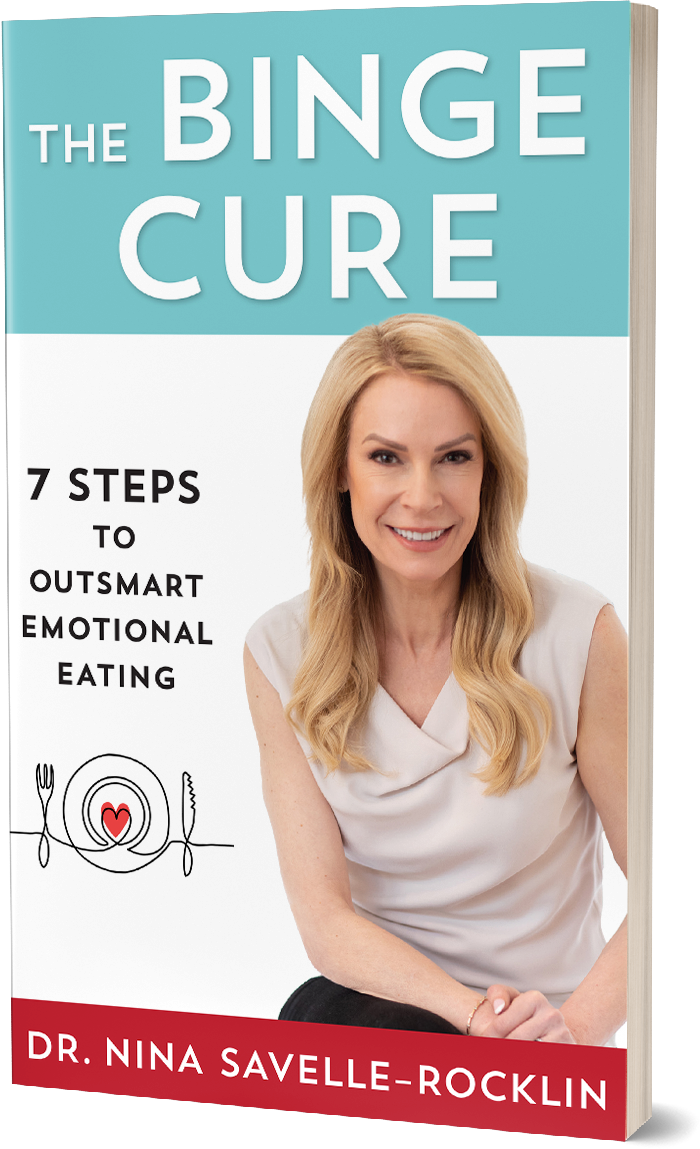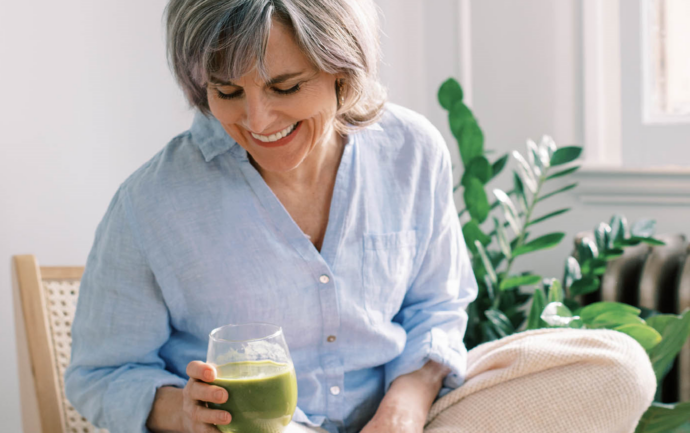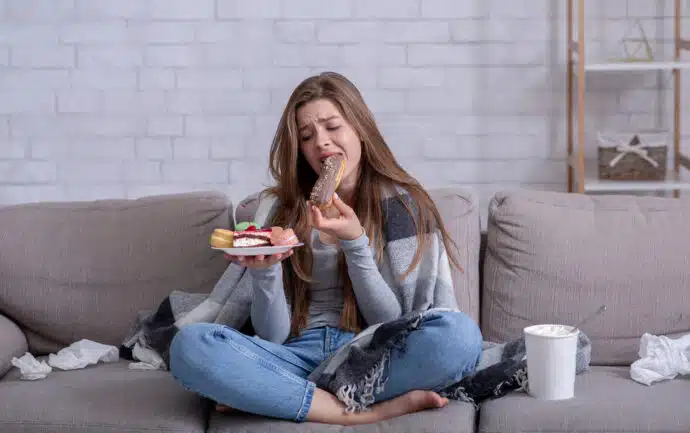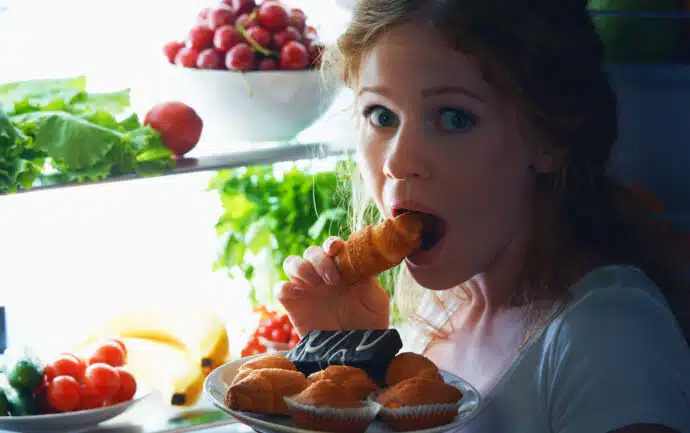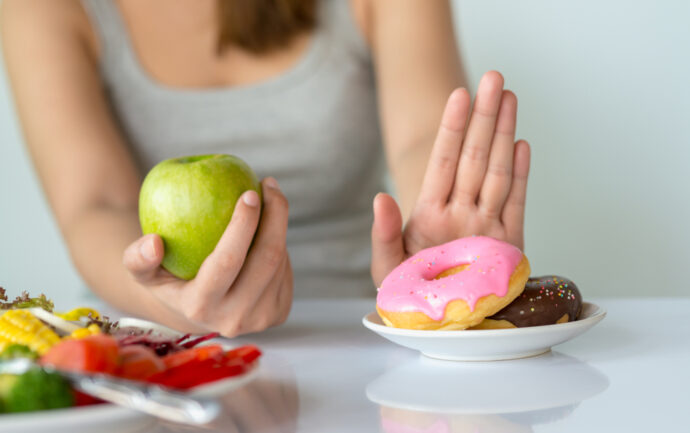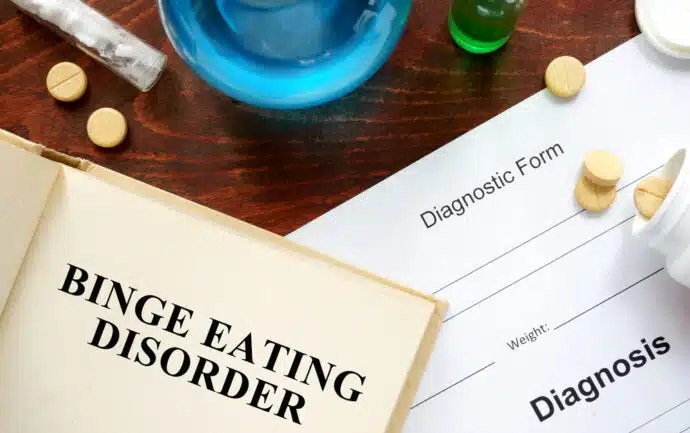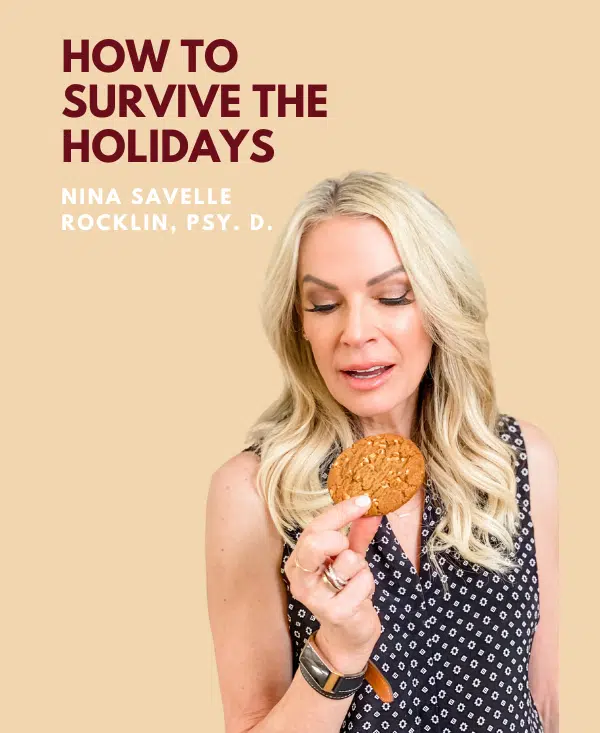Dr. Nina Savelle-Rocklin
How to Stop Feeling Guilty After Eating
Table of Contents
- Why do I feel guilty?
- Bingeing isn’t about food. It’s not about willpower or control.
- Why food?
- Get rid of the guilt trip
Sometimes, keeping promises you make to yourself is difficult, especially when those vows relate to dieting. The more you try to stop yourself, the more you’re drawn in. You feel pulled toward that forbidden food and resistance seems futile.
Finally, you give in — but just to take a bite. You feel guilty and have another bite. Soon, you’ve consumed the whole box or carton, plus whatever else is in the kitchen. That’s followed by a night of guilt, shame, and self-loathing.
I totally get you. Feeling guilty after bingeing is very common.
I’ve been there and I know how it feels. I also know that there is hope for change. You can turn that shame into support and break free for bingeing.
Read on to learn how to stop feeling guilty when you eat.
Why do I feel guilty?
We often set conditions to feel good about ourselves: “If I can’t do this, I’m not worth it.” And when we cannot fulfill those self-imposed expectations and restrictions, we feel bad about ourselves. So when you eat a forbidden food or binge, you break the expectation you set for yourself. That’s followed by mean self-talk, bashing, and shame.
Maybe you blame food a trigger, resent your inability to control yourself and decry your lack of willpower.
Bingeing isn’t about food. It’s not about willpower or control.
If you feel guilty for what you’re eating, whether or not that turns into a binge, something psychological is happening.
Sometimes that’s about deprivation. We tend to want what we think we can’t have. If you tell yourself you’re not going to have cookies, it’s hard to stop once you start eating those cookies.
Sometimes it’s about displacement. If you’re turning to food, chances are you’re turning away from something else. We eat to avoid feeling emotions that we don’t want to feel or thinking thoughts we don’t want to think.
So we turn to the most convenient and easily accessible way to suppress our feelings and soothe yourself — food.
Why food?
Many of us turn to food when we are upset, lonely, or bored because our first experience of love, safety, and bonding is connected to being fed in infancy.
When you see a parent feeding a baby, you see love flowing between them. For a baby or a young child, being held in a mother’s or father’s arms, feeling loved and safe, is bound up with the experience of feeding.
Food is experienced as love and even more, as a form of relationship.
We learn to associate food with a blissful connection to another person. The experience of being fed becomes an experience of being loved.
That’s why— and this may sound a little strange at first—deep in our psyches, food represents people. When we turn to food to feel better, we are actually trying to experience soothing, comforting, or relaxing.
When we talk about “comfort food” we’re actually needing a sense of being comforted by another person.
The next time you turn to food, think of the emotions you’re trying to avoid. What are you pushing away? What incident might have upset you?
What feelings are you trying to avoid? In no particular order, these feelings include anger, sadness, anxiety, guilt, shame, loneliness, and shame.
As counterintuitive as this may sound, the only way to get rid of your feelings is to feel them.
You cannot stuff down your feelings. Bingeing is a temporary way of coping that only leaves you feeling worse. So, identifying and acknowledging your feelings is the first step to lasting change.
Here are three habits that can help you get rid of the guilt trip you feel after eating.
Get rid of the guilt trip
First, go on a word diet
Let’s do a quick check on your self-talk. How do you talk to yourself? What words do you use when talking to yourself? Words can be extremely powerful and can affect your experience of yourself and the world. Words leave an impression on your mind even if you shrug them off. Over time, those impressions become stronger and affect how you think.
Here are 7 words I recommend you eliminate from your vocabulary:
- Fat
- Can’t
- Stupid/Dumb/ Idiot
- Normal
- Ridiculous
- Should
- But
(Let me know which words you use the most in the comments below.)
I do a deeper dive into explaining how these words affect your mindset and psychology in great detail, along with examples in my book The Binge Cure: 7 Steps To Outsmart Emotional Eating.
Second, turn your inner critic into a friend
“If you talked to your friends the way you talk to your body, you’d have no friends left.”
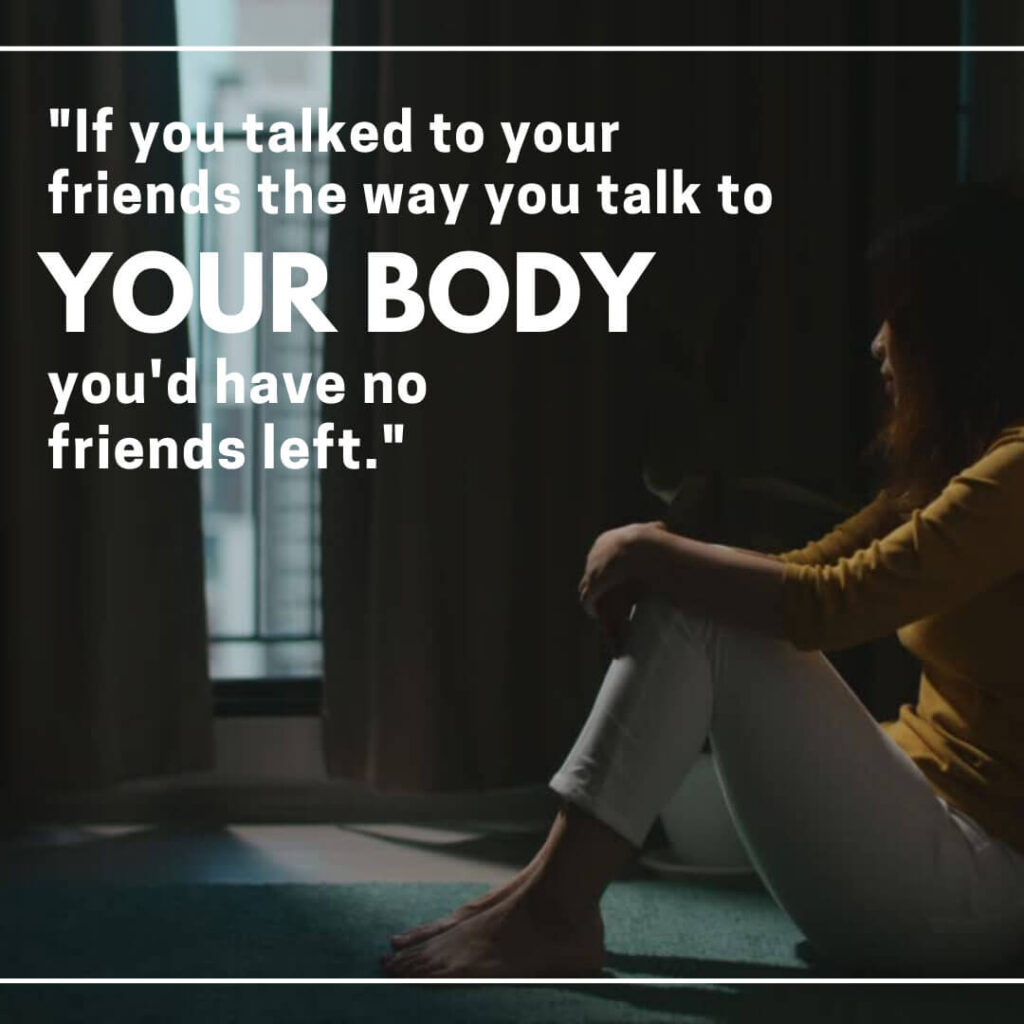
It’s a beautiful quote by body image expert Marcia Hutchinson and a reminder of how harsh and critical we can be of ourselves. The way you talk to yourself determines the way you feel about yourself.
Imagine how you’d talk to a friend who just binged. Would you yell at them in disgust and tell them how horrible they are? Would you make them feel guilty?
Probably not. You’d speak in a supportive and encouraging way. You’d give your friend kindness and understanding and they’d feel much better.
The next time you turn to food or binge, show the same level of compassion to yourself. You’ll feel so much better.
Third, accept that change is a process
A caterpillar doesn’t immediately turn into a butterfly. Any kind of change or evolution is a process. Maybe you promised yourself you wouldn’t eat brownies or chips, and you ended up having every brownie and chip in the house.
Instead of getting mad at yourself or feeling guilty, use this situation as an opportunity to discover more about the underlying reasons that caused the binge. What were you feeling? Were you sad/ mad/ guilty/ lonely? Or were you hungry because you didn’t have enough during the day?
The journey of life can sometimes be a difficult and challenging one. When we take two or three steps forward in our lives, we often find ourselves taking a step back. We might feel as if we’re back to square one, but that’s not true.
There are many opportunities for growth on these backward journeys – use them as prompts to become more aware of what’s happening within yourself. Instead of feeling guilty about eating, look at it as an opportunity for self-reflection, because that actually creates progress.
By healing our relationship with ourselves, by identifying our emotions and responding to them, by accepting ourselves and being supportive, we make peace with ourselves. That’s the necessary ingredient to make peace with food and get you started on a binge-free, happy life.If you feel alone, connect with people following the same path. Join our private Facebook community group. For more tips, follow me on Instagram to get a daily dose of wisdom to escape food obsession, guilt, and body shame.
Ready to transform your relationship with food?
Join Dr. Nina's newsletter and receive:
• Expert tips on overcoming emotional eating
• Strategies for sustainable weight loss
• Exclusive content not found anywhere else
Don't miss out on the latest breakthroughs in binge eating!
The Author
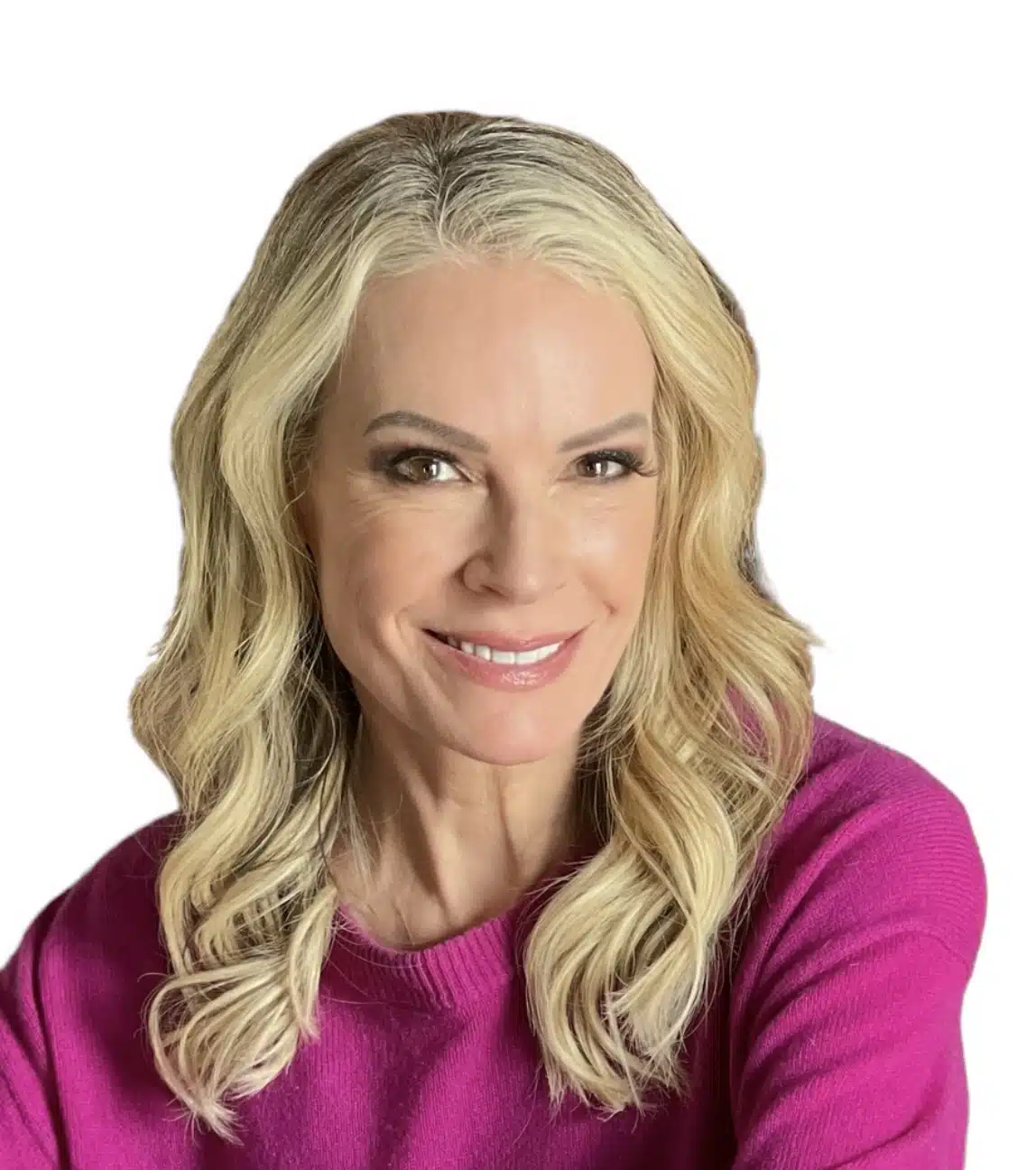
Dr. Nina Savelle-Rocklin is a renowned author and podcast host and one of the nation’s leading psychoanalysts known for the psychology of eating. Her signature message of, “It’s not what you’re eating, it’s what’s eating ‘at’ you” has resonated with hundreds of thousands of listeners from around the globe in 40 countries. As founder of The Binge Cure Method, she guides emotional eaters to create lasting food freedom so they can take back control of their lives and feel good in their bodies.
Related Blogs

